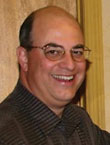John Mennell '82 heads literacy program for children
By Carole Stone

John Mennell's literacy project puts new magazines in the hands of children who love to read and distributes used magazines to homeless shelters, domestic violence shelters and food pantries.
Both MagazineLiteracy.org, Mennell's online distributor of new periodicals, and Kinderharvest, which collects used ones, are at the center of his three-year-old, not-for-profit charitable organization, Magazine Publishers Family Literacy Project. Mennell's motto: Changing the world -- one magazine at a time.
"The idea for the Magazine Publishers Family Literacy Project came to me while organizing hunger relief efforts," says Mennell '82, who was a public policy major in the College of Human Ecology. "Families unable to afford food certainly could not afford magazine subscriptions for their children. How wonderful would it be to arrange subscriptions for children and families so they could experience the joy that we knew and strengthen their reading skills at the same time."
The project's all-volunteer staff and five-member board of directors encourage corporations and individuals to join its national network of brokered gift subscriptions.
As a social entrepreneur, Mennell would like to distribute magazines as creatively and diversely as possible. Environmental awareness and curbside recycling were part of the impetus for KinderHarvest.
"It's the free market that determines if an idea is compelling and deserves support," he says. "We're driven by entrepreneurial notions to strengthen the project: some of the same benefits and some of the same methods. We try to be innovative and business-minded in the way we organize our work."
All his life, Mennell had expected to follow in the footsteps of a great-uncle who studied medicine in Stimson Hall in 1926 at Cornell. His family was not well off, he says, and he switched from nutrition and medicine to public policy when, in the early 1980s, he became involved in rallies to preserve financial aid.
Mennell later went to work for Congressman Matt McHugh in Binghamton and then for Congressman John LaFalce in Washington, D.C., as a press secretary and legislative aide for education and employment issues. In Washington, he started working on large-scale food drives, eventually creating a national, toll-free telecommunications network that connected more than 50,000 calls from hungry people to community food pantries and other local organizations.
After an unsuccessful run for the Maryland Legislature and a software engineering and technology consulting career that spanned the banking, telecommunications and public sectors, Mennell resettled in the Princeton, N.J., area and revived his idea for the literacy project, which had been in the back of his mind since 1994.
"The most important message to being successful on a large scale is to leverage ways to replicate what you're doing," Mennell says.
He should know. In 1992, Mennell received a Governor's Volunteer of the Year award for organizing the Web-based food network that has served as a model for other national hunger relief hotlines. For leveraging innovative technology in public service, Mennell's food pantries project was recognized by the ComputerWorld/Smithsonian Award program and the Benton Foundation. The plan for his project is now part of the permanent research collection of the Smithsonian Institution.
Carole Stone is a senior writer in Cornell's Office of Publications and Marketing. This story is adapted from an article that originally ran in the fall 2007 edition of LINK, the College of Human Ecology's alumni magazine.
Media Contact
Get Cornell news delivered right to your inbox.
Subscribe